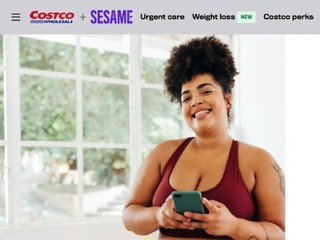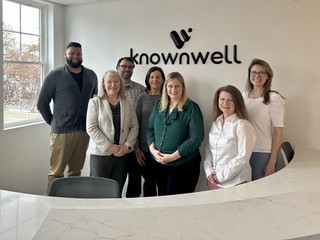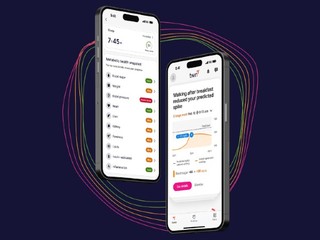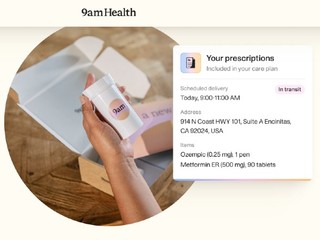Digital health funding declines for the third year in a row
AI-enabled digital health startups raised $3.7B, 37% of total funding for the sector
Read more...
Once it was discovered that GLP-1 drugs, which were originally designed to help diabetics control their blood sugar, could be used for weight loss they caught on in a flash: a poll conducted last year found that nearly half of adults would be interested in prescription weight-loss drugs. Yet, there are problems with that, including that 68% of people who start taking them stop within a year, leading to rebound weight gain.
"Part of that is the side effects, part of it is the cost, there's a lot of high co-pays associated with these medications, and part of it is the fact that it's an injection, and some of it is also that, at some point, you don't see the intensity of weight loss and so people think, 'I can't get off of it,' but when they stop it, they rebound weight gain," said Lisa Shah, chief medical officer of Twin Health, the creator of the Whole Body Digital Twin, an AI-powered dynamic model of each individual’s unique metabolism.
"Also when they're on it, they're losing healthy weight, like muscle mass for instance, because the GLP-1 is not discerning between the type of weight. What it's really doing is taking away the desire to eat and so it's a very different approach to weight loss."
In order to help people lose and maintain their weight, while also getting them off of these medications, Twin Health unveiled a new program on Wednesday called Healthy Weight to address the challenge of weight loss and obesity.
Founded in 2018, Twin Health uses patented artificial intelligence and machine learning-based technology, built from thousands of data points collected daily via wearable sensors, clinical lab parameters, and self-reported preferences, to create the Whole Body Digital Twin, which is then used to create a personalized and customized treatment plan for each member based on their current metabolic health. It's also used to educate them, guide them, and empower them to reach their goal of healing their metabolic system.
When members join the program, the company works with them to get them set up with its app, answer all of their questions, help them schedule their lab appointments, which then feed into the Digital Twin technology, get them set up with our sensors, such as CGM, smart watch, and body composition scale, so they are ready to jump into the program.
Once onboarded, members will interact with the mobile app to both input information and review their plan for improving their metabolic health, including daily food and exercise recommendations, and more. The Twin Health Care team will continue to interact with members throughout their journey to provide the highest level of care, be there to answer questions, and ultimately be a cheerleader for each member as they progress on their journey.
The Healthy Weight program
While Twin Health started with a focus on type 2 diabetes, the Healthy Weight program is its first foray into other metabolic diseases, specifically obesity.
The new program will, in many ways, resemble the company's existing program, with the same Whole Body Digital Twin and a compassionate clinical care that people with diabetes have access to, but with a different emphasis, Shah explained.
"The digital Twin learns and evolves daily, it takes a few weeks to achieve and reach critical mass and then begins to grow micro incentives that are highly personal and achievable and satisfying for the members. So, for example, it will say, 'you're on your way to getting off of your GLP-1, we expect you to reduce and eliminate this drug in four weeks and continue to see another five pounds of weight loss.' And then, after that, it'll say, 'congratulations, you've achieved another few pounds of weight loss. And, by the way, we have a combination of foods that is better for you than this nutritional combination,'" she explained.
"The same things that are very personalized, as we've done in type 2 diabetes, but with a very precise focus on weight and healthy weight, including muscle mass, visceral adiposity, including waist circumference, looking at all of those pieces, as opposed to really just honing in on blood sugar."
One thing that's unique about the program is that it doesn't ask users to count calories or carbs, instead asking them to follow the rubric of what the best foods are for their precise metabolism based on their own body, which Twin Health figures out by focusing its recommendations on nutrition, activity, and sleep, all three of which factor in on weight gain and weight loss. When it comes to nutrition, for example, the focus is on what foods are high satiety for that individual, meaning what foods fill them up and what are high metabolically driving foods for them, or foods that actually improve and increase metabolism, as opposed to slowing it down.
There's also a behavioral modification aspect to the program as well, with the company creating a holistic solution that factors in the individual's lifestyle, including their daily activities.
"We understand that, for some people, food represents a behavior and they have a relationship with food. So, this isn't really looking at eating disorders, we're not doing any of that, but we know that people will maybe eat at a certain time at night, or we know that when they're stressed or we know when they're happy and euphoric, they're eating more. And so, we understand that; people will share with us the feelings they have at the time of hunger, which is a very unique aspect of our model," Shah explained.
Underlying all of that is still the same concept which is Digital Twin technology, AI, thousands of data points a day that allow the company to look at the cause and effect in the person's metabolism so it can understand what happens when they eat a specific food with a specific satiety index.
"We're looking at those causes and relationships for people to really get a better sense of how they achieve balance and a healthy relationship, not only with food, but with weight loss."
Employers and health plans
Twin Health is offered through employers and health plans as a benefit to their employees or members, both of whom are struggling thanks to the increase in GLP-1 medication usage, which has led to rising costs amongst the diabetes population du to these drugs being prescribed more. In addition, they're being subscribed to people who don't actually have type 2 diabetes, meaning employers and health plans are having to make difficult decisions on coverage, including if they should cover GLP-1s at all and, if so, at what BMI.
Twin Health can help employers, regardless of their coverage policy; if they choose not to cover them at all but they're looking for alternatives to GLP-1 coverage, if they're looking to only cover them at a certain BMI, or if they want to cover it for everyone.
"Twin Health can support giving people a stainable program in conjunction with that coverage, allowing people, when they reach that BMI where you don't cover it anymore, to eliminate the drugs and continue to sustain impact," said Shah.
"We're meeting the needs of both the cost conundrum that employers and health plans are facing with this: they don’t have an open checkbook and they need to figure out their policies on clinical coverage and offer a sustainable weight loss solution that is really not a fad diet, is not something that's just going to be three months and done, but it's a sustainable model that allows people to get off these drugs or have an alternative to these drugs altogether."
Three initial partners
Twin’s Healthy Weight solution is being deployed at innovative employers including Applegreen, Bayview and Dayforce, all three of whom have worked with Twin Health on type 2 diabetes.
"They believe in Twin and they've seen the impact and they’ve wanted to expand. They're super innovative partners that really believe in sustainable solutions," Shah explained.
"They’re all also tired of these one off, siloed disease specific solutions: something for my diabetes, something for my weight, something for my liver disease, hypertension, and they want something they know is going to create lasting, sustainable, and well rounded metabolic outcomes for them."
While the Healthy Weight program is just now launching, it has already been able to show results with its initial partners, including members already losing upwards of 5% to 10% of their weight.
"We're really excited about the early results and we're confident we offer something that is unique, it’s differentiated because personalized, it focuses on people’s unique metabolism, they're learning things about themselves they didn't know and we're able to not only achieve these clinical outcomes pretty rapidly but sustain them and get people an alternative that is focusing less on a number or weight and more on a healthy metabolic state," Shah said.
A positive relationship with food
While Twin Health's goal is to get people off of GLP-1 drugs, that doesn't mean they don't have a role to play in healthcare, particularly in the morbidly obese population, where they can serve as an alternative to bariatric surgery.
The issue that the company is looking to solve is how to get people to maintain their weight without the need to keep taking these drugs, whether they're diabetic or not, because there's no exit strategy for getting off them currently.
Instead, Twin Health can support a sustainable exit strategy that allows for continued weight loss and continued improvement without these drugs, while also allowing its users to continue to be able to enjoy food.
"We want food to be a positive thing. We want people to be able to break bread with their families and loved ones. sit at the dinner table and want to eat and enjoy food with their family. We just want them to be able to figure out what foods that they love and that they can sustainably continue to consume, that they can afford their lifestyle. What are those foods that give them the highest level of satiety, the highest metabolism, and metabolic rate? And if they are on one of these drugs, how can we safely help them get off this drug, avoid those side effects, and then still sustain and continue to achieve a healthier weight?" she said.
"That's the goal, to both support people who maybe don't need these drugs and are looking to get to a healthier weight, and then those people who do need them because they are 40+ BMI but when they get down to 35, how do we get them off of them?"
AI-enabled digital health startups raised $3.7B, 37% of total funding for the sector
Read more...OXcan combines proteomics and artificial intelligence for early detection
Read more...Nearly $265B in claims are denied every year because of the way they're coded
Read more...


